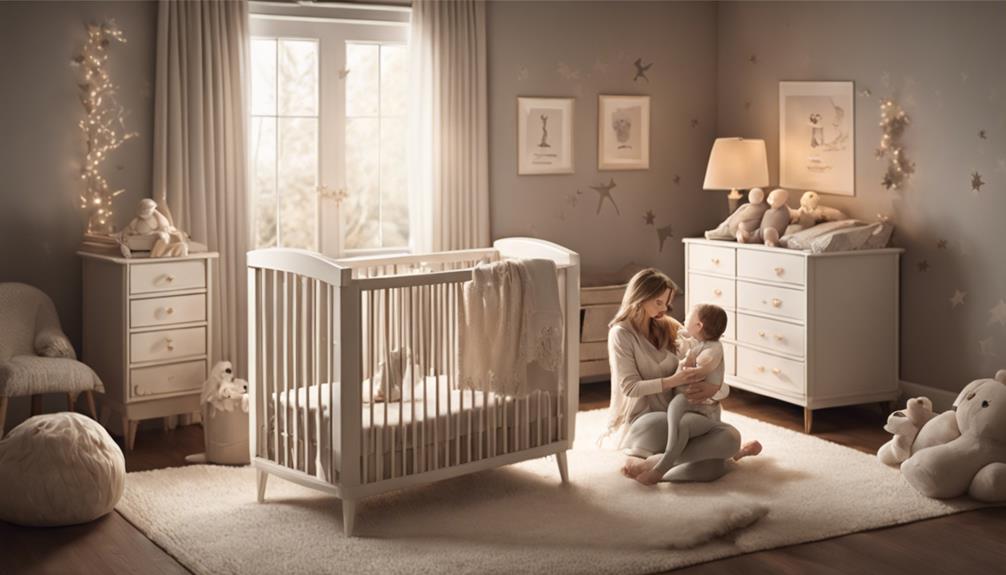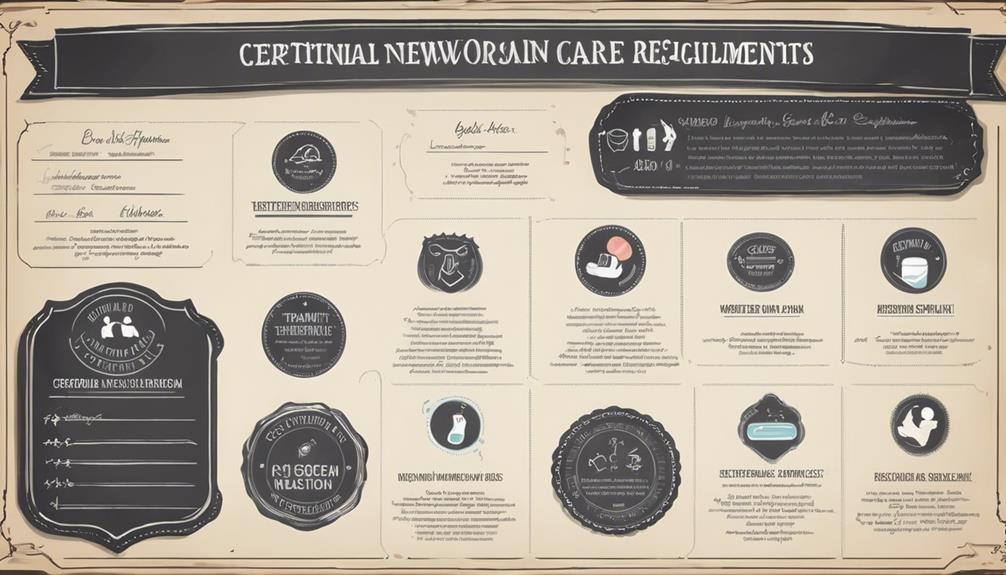As new parents, we recognize that there is a wealth of information available on newborn baby care. However, when it comes to ensuring the well-being and joy of your precious child, having a reliable guide can make a real difference.
From mastering the art of swaddling to decoding your baby's cries, this guide offers practical tips and expert advice to help you navigate the early days with confidence.
Stay tuned to discover how you can create a nurturing and safe environment for your newborn's growth and development.
Key Takeaways
- Breastfeeding or formula feeding every 2-3 hours is crucial for newborn nutrition.
- Change diapers frequently, use gentle wipes, and keep the diaper area clean.
- Soothe your baby with gentle touches, skin-to-skin contact, and swaddling.
- Monitor baby's health closely, seek medical help for any concerning symptoms or issues.
Feeding and Nutrition
When caring for a newborn, feeding and nutrition play an important role in their growth and well-being. Breastfeeding is recommended for at least 6 months to provide essential nutrients and foster bonding between the newborn and the mother. It's a beautiful way to nurture and connect with your baby while offering them the best start in life. However, if breastfeeding isn't feasible, formula feeding guarantees that your little one still receives the necessary nutrition for healthy growth and development.
Newborns typically need to feed every 2-3 hours, amounting to around 8-12 feedings a day. This frequent feeding schedule is vital to support their rapid growth and development during this critical stage. Remember, burping your baby after feeding is important to prevent gas and discomfort, aiding in better digestion.
Consulting a healthcare provider for any feeding concerns is always a good idea. They can offer personalized guidance and support, whether you're struggling with breastfeeding or maneuvering the world of formula feeding. Your baby's nutrition is key to their overall health, and getting the right support can make a significant difference in their well-being.
Diapering and Hygiene
To guarantee your newborn's comfort and skin health, maintaining a consistent diapering routine is essential. It is important to change diapers frequently, around 10 times a day, to prevent diaper rash and maintain proper hygiene. When changing diapers, use gentle wipes and diaper cream to protect your baby's delicate skin. Remember to wipe gently from front to back to prevent infections and irritation in the diaper area. Keeping the diaper area dry and clean is key to minimizing the risk of diaper rash and discomfort for your little one. Dispose of diapers properly in a sealed trash can to guarantee a clean and odor-free environment. Here is a helpful table summarizing key points for effective diapering and hygiene:
| Key Points | Description |
|---|---|
| Change diapers | About 10 times a day |
| Use gentle wipes | Protect baby's skin |
| Diaper cream | Helps prevent diaper rash |
| Dispose of diapers | In a sealed trash can |
Soothing Techniques
Wondering how to effectively soothe your newborn baby during those fussy moments? When it comes to calming techniques, here are some essential soothing techniques to help you bond with your little one and provide comfort:
- Engage in gentle stroking and cradling: By gently stroking your baby and cradling them in your arms, you can create a sense of security and closeness that helps soothe them.
- Utilize soothing sounds and movements: Use soft vocal sounds, soothing music, and gentle movements to calm your baby and create a calming environment.
- Practice skin-to-skin contact: Skin-to-skin contact not only promotes an emotional connection but also provides comfort and warmth for your newborn.
Being mindful of your baby's sensitivity to touch, light, and sound is important in finding the most effective soothing techniques. Additionally, swaddling your baby can help recreate the feeling of being in the womb, offering comfort and reassurance.
These practices not only soothe your baby but also strengthen the emotional bond between you and your little one.
Sleep Schedules

As we navigate the care of our newborns, understanding their sleep schedules plays a pivotal role in ensuring their well-being and development. Newborns typically spend around 16-17 hours per day sleeping, supporting their essential growth and development. Their sleep patterns often consist of shorter periods of 2-4 hours due to their feeding needs. By the time babies reach 3 months of age, many can sleep through the night for 6-8 hours, establishing a more consistent sleep pattern.
Highlighting that newborns develop their own sleep cycles and patterns, which can vary from one baby to another. While some babies may not yet sleep through the night at 3 months, this is a common part of them adjusting to life outside the womb. Understanding and adapting to your baby's individual sleep needs can help promote a more peaceful and restful environment for both baby and caregiver.
Health and Safety
Keeping your newborn safe and healthy requires vigilance and prompt action when observing any signs of illness or discomfort. It's important to pay close attention to your baby's well-being and seek medical advice if you notice any concerning symptoms. Remember, your little one's health is a top priority.
- Monitor Fever: A fever in a newborn, indicated by a rectal temperature of 100.4 F or higher, can signal a more severe underlying issue. Contact your pediatrician promptly.
- Watch for Signs of Illness: Even without a fever, be alert for changes in eating patterns, excessive sleepiness, or other unusual behaviors. Seek medical attention if you notice anything concerning.
- Address Specific Concerns: Keep an eye out for red or swollen rashes, umbilical cord issues, a distended abdomen, or vomiting. These symptoms may require immediate medical intervention to safeguard your newborn's health and safety.
Frequently Asked Questions
What Is the Essential Care of a Normal Newborn?
We provide essential care for a normal newborn through thermal support, infection prevention, breathing techniques, feeding support, and monitoring for danger signs. These practices help establish the health and well-being of the newborn in their early days.
What Do I Need to Care for a Newborn Baby?
With all the essentials for caring for a newborn – diapers, wipes, a cozy crib, grooming supplies, feeding gear, and healthcare items. Let's make sure your little one is happy and healthy!
What Essentials Should I Buy for My Newborn?
When preparing for a newborn, essentials to contemplate include diapers, wipes, onesies, swaddle blankets, a car seat, crib, baby bottles, burp cloths, thermometer, bath products, nail clipper, nasal aspirator, baby hairbrush, first aid kit, diaper bag, baby monitor, breastfeeding supplies, baby carrier, swing, nursing pillow, and laundry detergent.
What Are the 5 Steps of Newborn Care?
We guarantee top-notch care for newborns through thermal maintenance, infection prevention, breathing support, feeding assistance, and monitoring for danger signs. These steps promote health and well-being, setting a strong foundation for the baby's growth and development.
Conclusion
To sum up, remember to follow the feeding and nutrition, diapering and hygiene, soothing techniques, sleep schedules, and health and safety tips outlined in the essential newborn baby care guide.
By practicing proper care and creating a nurturing environment, you can help your newborn thrive and flourish.
So, stay steady, stay savvy, and watch your little one grow and glow with grace and guidance!









